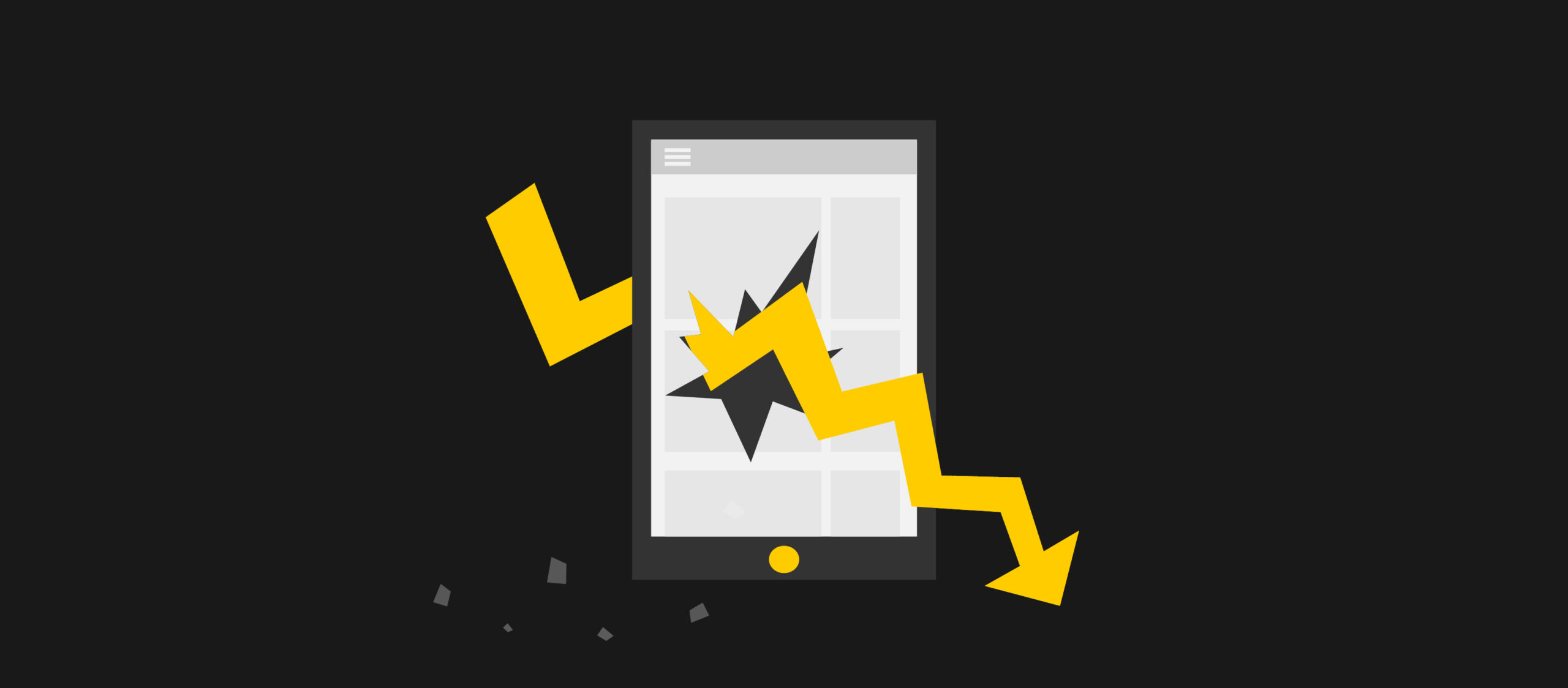Mobile apps have become the heartbeat of modern life. Every day, more and more individuals embrace the magic of mobile apps, revolutionizing the way we connect, communicate, and even quench our online shopping cravings.
So, millions of apps are out there, but do they all work? Of course not. Plenty of mobile apps might have seen the light of day but didn’t survive. Why? What could’ve gone wrong with them? What made them fail?
Here are 8 common reasons why most apps fail:
- It’s not a problem-solving app
- Too many or too few features
- Poor UI/UX design is a reason why most apps fail
- Poorly researched audience
- Inadequate marketing strategies
- Don’t have monetization plan in place
- Choosing platforms unwisely is why most apps fail
- The app isn’t engaging enough.
1. It’s Not a Problem-Solving App
The most common reason why most apps fail is that they’re created without a purpose. Mobile apps are created to solve real-time problems, and if your app doesn’t do that, it’s most likely to meet failure soon.
In the mobile app industry, creativity wins the market. While looking to find an app idea, conduct thorough market research. And if you already have an idea, see if there’s already an app that solves the problem you want to solve with your app. Of course, you can still develop an app with similar goals as an existing one, but you need to be more creative and unique and become an improved version of that app.
Understand and research the market to find out what problems users face every day. Study your competitor’s app and find out what features are needed and what needs to be fixed. This way, you’ll provide a solution for users who can’t find it in your competitor’s app.
2. Too Many or Too Few Features
Many mobile apps are abandoned because they don’t have balanced features. There might be too many or too few features. That’s another reason why most apps fail.
Users will stop the app right after their first use if they don’t find unique features. They’ll also stop it because there might be too many features that make the app complex.
Simple and clean apps without many features to take over the screen are the ones that survive. So, if you want your app to succeed, be more selective when integrating features. But make sure to include all important features.
You must define your goal, and the features should align with the goal of your app. This way, you’ll avoid the “too many or too few features” problem and keep your app balanced.
If you need to figure out if those features will work, testing your app idea before full development is better.
3. Poor UI/UX Design is a Reason Why Most Apps Fail
The first thing we do when we use an app for the first time is scroll and see what’s there. And the first thing that catches our eye is design. User interfaces and user experiences are not just about looks. It’s about how the user feels when they use your app.
When developing an app, you must take care of the user experience provided through app design. It’s something that can lead users to uninstall your app quickly.
The design must have smooth animations; slow animations can irritate users. Strictly avoid features that are difficult to access, long loading animations, and long registration process. Remember, your app should make users’ lives easier, not annoy them.
4. Poorly Researched Audience
Audience research is necessary when developing an app that addresses specific user needs. You may think you developed an app that everyone will love, but that’s not true. Not everyone finds your app as a solution to their problems. That’s why your app needs its audience. You have to identify the demographics of the product and create a user persona. User personas are a semi-fictional representation of your target customers. The more personalized user personas, the better.
Deciding to build an app without researching the market and defining the audience is not a smart move. It will lead you to failure.
5. Inadequate Marketing Strategies
Most apps fail because they don’t have adequate marketing strategies, even though they have a successful development process. After developing and launching your app, don’t expect to achieve success overnight.
The competition in the app market is huge. People have difficulties knowing which app to choose with all those apps around. So, remember that your app won’t go into the user’s hands immediately once submitted to app stores. Your job is not done.
No matter how good your app is, it won’t reach the masses without a good marketing strategy. If you don’t have a robust marketing strategy plan, your app will not gain popularity and will most likely fail.
Social media is an excellent tool to market your product. Also, you can use promotional ads.
6. Don’t Have a Monetization Plan in Place
This might sound weird because you would think that the primary goal of your app is to reach users and not just profit. Well, that’s not it. In the end, your app needs money. Without a proper monetization plan in place, you won’t be able to profit from your app. And without some source of income, you won’t be able to update features and provide new things for users to keep returning to your app.
People may use your app for some time, but if you don’t offer them something new, they’ll get bored and uninstall it. That’s why you need app monetization; it’s all related.
Fortunately, there are many ways to profit from an app. You can use advertising, sponsorship, or in-app purchase methods. You must have a monetization plan before starting to develop your app.
7. Choosing Platforms Unwisely is Why Most Apps Fail
One of the reasons that your app might fail is choosing the wrong platform to submit it. Android and iOS, for example, operate differently and appeal to different users. Always remember that every mobile app’s primary goal is to offer customers a solution to a particular issue they all share.
It will be challenging to create an app that specifically serves the demands of your target user group without a thorough understanding of how user behavior varies among operating systems. It becomes a major problem when apps fail to perform well on operating systems, networks, and devices. For example, many people may get frustrated about why an app would work on an iPhone but not an iPad.
Make sure to know your app’s goals and purpose before choosing which platform is best for you.
8. The App Isn’t Engaging Enough
You must know that a download indicates interest but doesn’t imply that the user will use your app constantly. People can choose from millions of free apps, including your competitors. So, try to interact with users and remind them about your software and its features. Otherwise, someone else will swoop in and catch your user’s attention.
You can send in-app messages, personalize notifications, or include an activity feed.
If good is not enough, do better!
You may spend a lot of time planning and developing your app, but if people won’t use it enough, there’s no point. Many app developers spent a lot of time on an app, yet they failed. So, if you want to avoid failure, learn the reasons that cause it.
Before developing an app, give it a purpose, research the market, and plan your marketing and monetization methods thoroughly. Also, choose your platform wisely and interact with users. Without these strategies, your app will most likely fail.
Developing a successful app requires effort. If good is not enough, do better!




